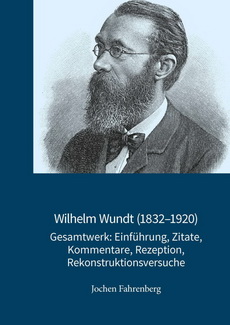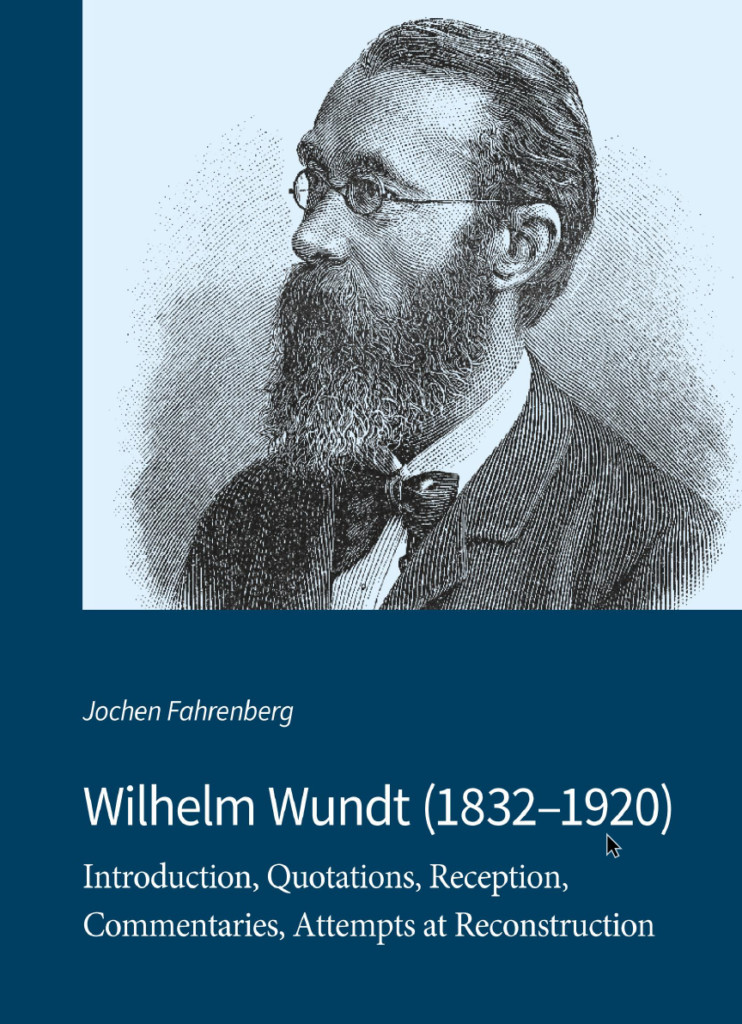Jochen Fahrenberg

Inhaltsangabe
Wundts Konzeption der Psychologie entstand während einer jahrzehntelangen Forschung und Lehrtätigkeit, die ihn von der Neurophysiologie zur Psychologie und Philosophie führt. Er hat damit einen theoretischen Horizont geschaffen wie kein späterer Psychologe.
Sinnespsychologie, Neuropsychologie,
Psychophysiologie, Tierpsychologie,
Allgemeine Psychologie,
Kulturpsychologie, Ethik,
Erkenntnistheorie und Methodologie, Philosophie
Die Allgemeine Psychologie und die Kulturpsychologie („Völkerpsychologie“) haben eine gemeinsame Basis in Wundts Prozesstheorie psychischer Verbindungen: der Apperzeptionstheorie. Wundt hat auch die erste genuine Wissenschaftstheorie der Psychologie entwickelt. Dazu gehört eine vielseitige Methodik, gleichermaßen eine Kompetenz für das experimentelle und das interpretative Verfahren.
Wenn zeitweilig im Hauptstrom der Psychologie einseitige Auffassungen anziehend sind – Kognitivismus oder neurowissenschaftlicher Reduktionismus, die narrative Wende oder Computer-gestützte Modellierungen, die qualitative Psychologie, die phänomenologische Orientierung, die Psychoanalyse oder die gesellschaftskritische Neue Psychologie – ist es angebracht, an den theoretischen Horizont des Gründers der Psychologie als Disziplin zu erinnern. Er versuchte, geisteswissenschaftliche und naturwissenschaftliche Forschungsrichtungen zu verbinden – in einem souveränen Umgang mit den kategorial grundverschiedenen Betrachtungsweisen des Zusammen-gehörigen. Hier argumentierte er bereits in der Gründungsphase der Psychologie auf einem hohen Anspruchsniveau metawissenschaftlicher Reflexion, und dieses An-regungspotenzial ist bei weitem nicht ausgeschöpft.
Attraktiv geblieben ist Wundt wegen der von ihm angestrebten Einheitlichkeit der Wissenschaftskonzeption, denn es mangelt heute an anspruchsvolleren Diskussionen über den bestehenden Pluralismus der Richtungen und über koordinierte Strategien. Dazu gehören die kritische philosophische Reflexion der eigenen Voraussetzungen, die Fähigkeit und die Bereitschaft zu einem systematischen Perspektivenwechsel, gerade in der Psychologie, in der Forschung, im Studium und in der beruflichen Praxis .

Abstract
Wundt’s conception of psychology emerged during many decades of research and teaching, which led him from neurophysiology to psychology and philosophy. He thus established a unique, interdisciplinary, and comprehensive theoretical horizon not attained by any psychologist after him: Sensory psychology, neuropsychology, psychophysiology, animal psychology, general psychology, cultural psychology, ethics, epistemology, methodology, and philosophy. To elaborate a developmental theory of mind, which, for instance, seeks access to the genesis of thinking via the development of language, can be considered a central guiding idea in Wundt’s entire work. General psychology and cultural psychology (“Völkerpsychologie”) share a common basis in Wundt’s theory of apperception. In a generalized sense, apperception is an integrative process in which sensory impressions, feelings, and volitional activity are not just processed, but integrated and creatively synthesized. This process is dynamically influenced by the individual’s active aspiration, i.e. primarily by motives and not by cognitive control systems.
Wundt also developed the first genuine theory of science and methodology with respect to empirical psychology. His conception includes a multimethod approach, i.e. a competence for experimentation, as well as qualitative comparison and interpretation (hermeneutics). – When one-sided views become temporarily attractive in the mainstream of psychology – be it cognitivism or neurophysiological reductionism, computer-based modelling, psychoanalysis, phenomenological orientation, the narrative turn or the socio-critical new psychology – it is worth recalling the theoretical horizon of the founder of psychology as a discipline. Wundt encouraged psychologists to conceive of a coordinated strategy, referring to the distinct categories and principles valid for mental science and for natural science in order to assess the human being as a psycho-physical unit. Here, he argued during the founding phase of psychology with a high degree of meta-scientific reflection, which can still provide an impetus for current research.
Wundt’s conception has remained attractive because of its integrative foundation and comprehensiveness of his conception, particularly since controversies persist about the aims and methods of psychology and about shifting currents within prevalent theoretical orientations, as well as actual splits into subdivisions and highly specialized professional associations. Such developments demand continuous discourse about the controversies in theoretical psychology. This includes the critical philosophical reflection of one’s own presuppositions, and the ability and willingness to reverse perspectives systematically, especially in psychology, academic studies, research, and professional practice.
